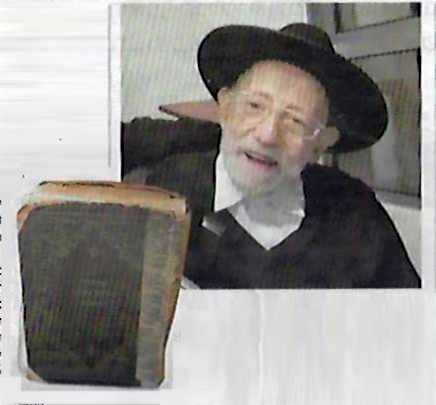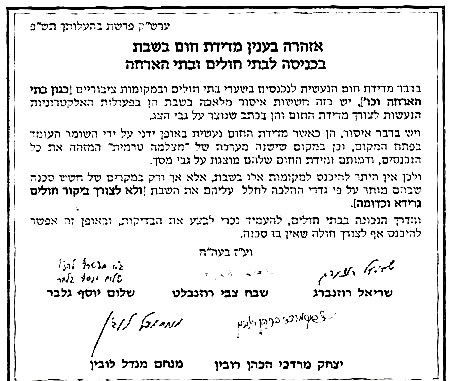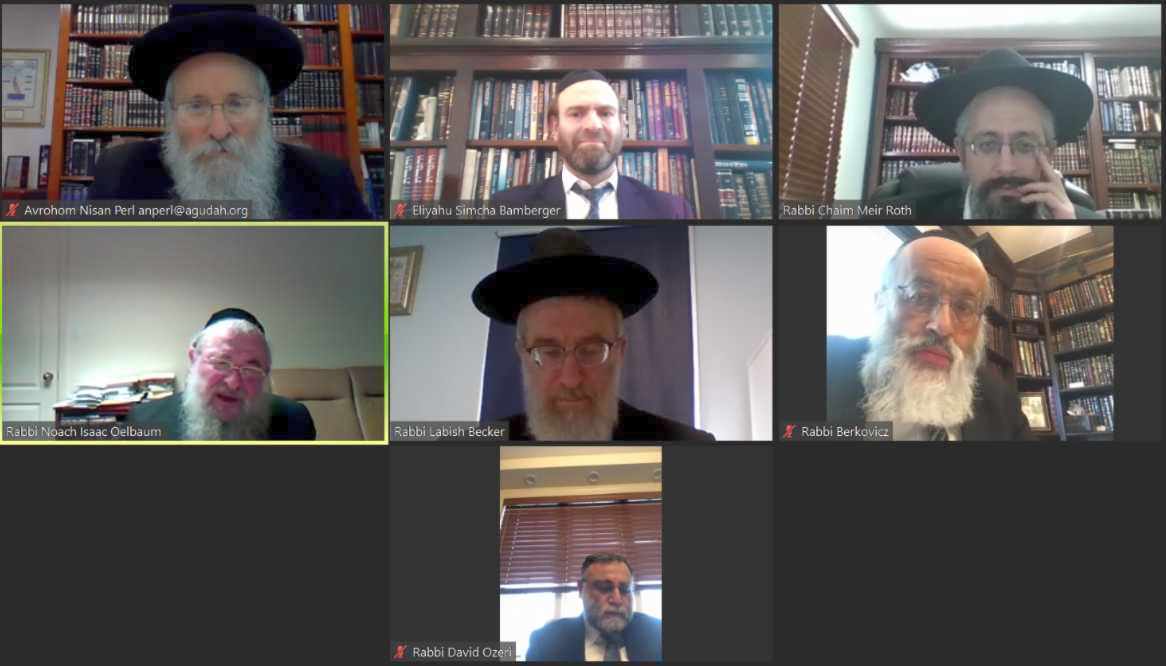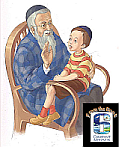  |
|
| |||||
This Google Custom Search looks only in this website. A Heavenly "Tzenter"
The following amazing, inspiring story came to light this week. It took place very recently, not as a dream but in broad daylight. We asked to hear it from the very person in question, HaRav Eliyohu Klaar, one of the foremost talmidei chachomim in the Givat Shaul neighborhood of Yerushalayim.
HaRav Eliyohu was born in Argentina. His father, R' Avrohom Moshe, was born in Poland, in 5693 (1933), and emigrated to Argentina with his family before the War. He lived in Argentina for most of his eighty-seven years. Even though this family and its offspring were raised in the Diaspora, their dream was always to eventually go up to Eretz Yisroel, at least towards the end of their lives.
Three years ago, the father, Avrohom Moshe Klaar, succeeded in making aliya from Argentina at the age of eighty. Shortly after, he settled into a Senior Citizens Home, Shomrei Hachomos, where he continued to lead a very regimented daily schedule as before, throughout his life.
One particular facet always drew people's attention: wherever he happened to be, one could always find his copy of the "Kitzur Shulchan Oruch" by his side, which he studied every day. He was thoroughly immersed in his Torah study and even taught others. All of his acquaintances knew that R' Avrohom Moshe and his Kitzur Shulchan Oruch were inseparable `friends'.
The measuring of temperature upon entering various hospitals and other public places, like guest houses etc., constitutes a problem of desecrating Shabbos, both because of the electronic activities involved and also due to the writing that appears on the display.
Having finally arrived at a point where post-pandemic life is slowly beginning to take shape and shuls have started opening their doors in a limited fashion, Klal Yisroel finds itself poised at a unique crossroads, one that is unprecedented in modern times. As our Rabbonim nationwide begin to lead us back to our regular routines, the Agudas Yisroel Conference of Shul Rabbonim hosted a virtual asifah, organized at the request of Shul Rabbonim nationwide, to crystallize the outbreak's positive messages and encourage their kehillos to carry that momentum forward.
The 200 Rabbonim from all across the country who participated in the Zoom teleconference heard messages of exceptional growth in the face of tremendous hardship. Tenacity was the theme of the day, with Rabbi Noach Isaac Oelbaum relating Rabbi Moshe Sherer's analogy that compared a Yid to a teabag, its flavor only fully developing when placed in hot water, and tasking listeners to continue rising to the challenge as the next chapter of life unfolds.
The question is asked why Charvona only deserves an honorable mention, rather than a full blessing. And why, altogether, does he get that much? Are we not told in Pirkei deR'Eliezer that it was Eliyohu Hanovi disguised as Charvona who gave the timely suggestion to King Achashverosh that Haman's gallows was all prepared?
We tend to think of an act of kiddush Hashem as something supremely heroic, involving personal risk and sacrifice, of one being prepared to die for Hashem. Jewish history is replete with people who did, in fact, lay down their lives for their Jewish principles, thus publicly sanctifying Hashem's name. We also think of an act of kiddush Hashem as something very noble, altruistic, that arouses our admiration, an outstanding act of chessed, perhaps with the dead, or an act that when performed by a religious Jew which receives publicity, brings credit to his ideals.
For some credible reason, a life of normal routine lived by a shomer Torah umitzvos, one who prays with devotion, interacts with others in an upright manner as the Torah dictates, does not always arouse within us the proper esteem and admiration.
From Our Archives
We Can All be Leviim
by Mordecai Plaut
Chosen as a group because of their dedication to Hashem, the Leviim were purified through special procedures detailed in parshas Beha'alosecho. The result of this was a special status whose essence is summarized in the succinct statement by Hashem: Vehoyu li haLeviim -- The Leviim are Mine (Bamidbar 8,14).
In the Torah, the content of the special role of the Leviim might appear somewhat technical, being described in terms of their assistance to the Cohanim in the service in the Ohel Moed and the specific responsibilities of the Leviim, that is, being like an honor guard around the holy areas and singing in the regular services.
Mame Loshon: The Battle For Yiddish
by Refoel Berlzon
The great battle for Yiddish has been abandoned. Yiddish is an untranslatable language: you cannot translate the language of the heart. It is a very important asset, but not an end in itself.
How did the Aramaic word "Shunra" enter the German language? The inhabitants of the Bavarian village of Schupfloch have a common secret: "Lakudish," a mysterious local dialect. This phenomenon of local dialects supplementing or supplanting the official German language is also to be found in other German villages. What is so special about Lakudish?
A teacher from the neighboring village of Feuchtwangen once visited Schupfloch looking for a job. He noticed that the locals called him with a strange word: "melamed." During his stay in the village he heard the inhabitants using other strange words, such as "matze" for bread without salt and "treife" for something flawed. A very long day was called "yom kippur" and a pejorative term for a wicked villager was "letz." The words, although taken from Hebrew, were pronounced with a clear Yiddish expression. Bad quality whisky was called "mayim sorof," i.e. sorof (whisky) made out of water. A chicken is a "tanengol" and a cat a "shunra"!
EARLIER EDITORIALS
A Mission to Spread
Daas Torah
Looking for the
Best in Yiddishkeit
The Immorality
of Palestinian Combatants and Noncombatants
|
|||||




.jpg)



